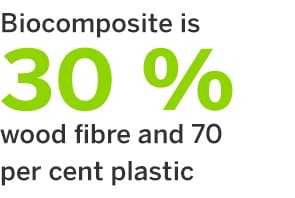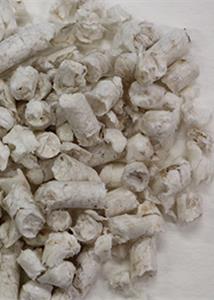The Prima chair has been designed for schools, and, therefore, it has to be durable and solid. It is made from a biocomposite, of which 30 per cent is wood fibre and 70 per cent plastic. Aqvacomp, which runs its operations next door to Metsä Fibre's Rauma pulp mill, has been developing the industrial production of biocomposite with Metsä Fibre since 2014. In 2017, the plant relocated to Metsä Fibre's Rauma mill area.
The plastic fillers usually used for strengthening the material are minerals and glass fibre.
"Glass fibre is difficult to recycle, and its production demands a lot of energy. Wood fibre helps us produce lighter products and save on logistics costs," says Markku Nikkilä.
Nikkilä is the CEO of Elastopoli, a company focused on research and development in the rubber and plastics industry. Elastopoli is the technology partner of Aqvacomp, which manufactures the biocomposite.
The carbon footprint of biocomposites is 20–40 per cent smaller than the carbon footprint of glass fibre composites, given that biocomposites can be processed faster and at a lower temperature.
The material is delivered to Isku's partners in the form of pellets. These are melted and injection-moulded into a chair frame. The chair is assembled at Isku's plan.
Glass fibre is difficult to recycle, and its production demands a lot of energy. Wood fibre helps us produce lighter products and save on logistics costs.
says Markku Nikkilä
Impact resistance is important
So far, the furniture company Isku Interior has been making the seat of the Prima school chair entirely out of plastic. The trials with composites began more than ten years ago, but adding wood fibre to the plastic proved to make it too hard and brittle.
"Aqvacomp's composite doesn't have this problem. Thanks to the wet web forming method, the composite is more elastic than traditional types, and it has good impact resistance," says Kari Soljamo, the Development Manager of Isku Interior, who is a polymer chemist by training.
A school chair needs to be impact resistant and stable.
"A school is not the easiest environment if you happen to be a chair. The chair must not break even if it is thrown against a wall," says Nikkilä.
The Prima chair is part of Sitra, the Finnish Innovation Fund's Branching Out (Puusta pidemmälle) project. The chair, made from plastic and Aqvacomp's biocomposite, is the only commercialised product from the project so far. The formula for the material was developed over a few years. The new biocomposite chair has already passed tests pursuant to the EN standard, and it meets Isku's quality requirements.
"With this product, we're aiming for the 2020 summer season of school furniture," says Soljamo.
Wood fibre an excellent reinforment
But why does the biocomposite include plastic? According to Nikkilä, the important thing is that in the future it will be possible to recycle plastic increasingly efficiently.
"Our biocomposite can be recycled six times without any deterioration of its properties. That's a big thing for the environment. Bioplastics are still too expensive for industrial use. They make up only around one per cent of plastic production, which is why they aren't available in sufficient quantities."
With the help of Aqvacomp's technology, the pulp from Metsä Fibre reinforces the plastic in three dimensions, whereas many other bio-based materials function solely as fillers for the plastic. The production process conserves nature, since it reduces the need for fossil-based plastic. Logistics costs are also reduced, because the material is light.
Elastopoli is a Finnish development company in the plastics and rubber industry. Elastopoli has licensed its technology to Aqvacomp and owns a small share of the company. With the help of Metsä Fibre, the companies have developed the biocomposite produced by Aqvacomp. Aqvacomp buys softwood pulp from Metsä Fibre's Rauma mill and is a tenant on the mill's premises. Isku is Aqvacomp's customer.


